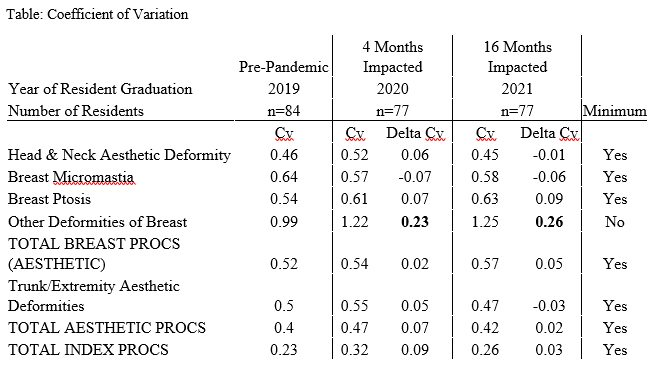COVID-19 Elective Surgery Shutdown and Aesthetic Operative Experience for Plastic Surgery Residents
Atlee Melillo1, Katherine McMackin1, Besher Tolaymat1, Nicole Jarrett1
1Cooper University Hospital, Camden, NJ
Background: The initial wave of the COVID-19 pandemic led to a temporary shutdown of elective procedures nationally. The purpose of this study is to evaluate the effect the pandemic had on the aesthetic operative experience of plastic surgery residents.
Methods: The Accreditation Council of Graduate Medical Education (ACGME) graduate self-reported case logs were retrospectively compiled for plastic surgery residents graduating the year prior to the pandemic (2019), those graduating 4 months into the pandemic (2020) and 16 months into the pandemic (2021). Average number of cases and standard deviation was compiled. Percent change was calculated comparing each year to the pre-pandemic baseline. Statistical significance was determined with a Student t-test comparing average number of cases. Coefficients of variance (Cv’s) were calculated to assess for changes in inter-program variation, which could be due to regional variation. Regional variation in experience was assessed by calculation of coefficient of variation (Cv). Average case volume was then compared to the minimum case requirements when applicable.
Results: The ACGME graduation case log statistics included 238 residents. Plastic surgery graduates in 2019, 2020 and 2021 had an average of 92.7, 98.1 (p=0.5) and 114.5 (p=0.016) breast aesthetic procedures, respectively. The average number of head and neck aesthetic cases was 131.6, 126.5 (p=0.6) and 135.5 (p=0.68). The average number of cases at graduation for aesthetic trunk/extremity was 122.1, 120.8 (p=0.9) and 139.1 (p=0.9). The average total number of aesthetic cases for a graduating plastic surgery resident increased from 2019 to 2021 for all aesthetic procedures, the increase in breast aesthetic procedures being statistically significant. The average total number of aesthetic cases for a graduating plastic surgery resident decreased from 2019 to 2020 for both head and neck aesthetic and trunk/extremity aesthetic procedures and increased for total breast aesthetic procedures, though these were not statistically significant.
Conclusion: The temporary hold on all elective procedures during the COVID-19 pandemic decreased the opportunity for plastic surgery trainees to meet their minimum case log numbers. The back log of cases subsequently rescheduled for 2021, after the hold on elective cases was lifted, might explain the increase in average case numbers throughout breast, head and neck and trunk aesthetic residents. Although only an increase in breast aesthetic procedures was significant, the data demonstrates that the suspension of elective procedures during the pandemic did not impact the average case number of graduating plastic surgery trainees.
Back to 2022 Abstracts


